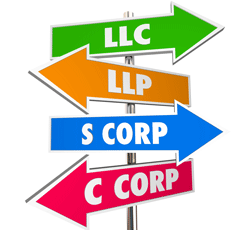
Tax Law Blog
 One of the biggest questions after the passage of tax reform is whether business owners should convert their pass-through entities to C Corporations to take advantage of the lower 21% tax rate. The answer to this question depends on your business goals. If your goal is to pass as much profit to yourself as possible, you should generally stick with the pass-through entity.
One of the biggest questions after the passage of tax reform is whether business owners should convert their pass-through entities to C Corporations to take advantage of the lower 21% tax rate. The answer to this question depends on your business goals. If your goal is to pass as much profit to yourself as possible, you should generally stick with the pass-through entity.
The tax reform legislation lowered the tax on C Corporations to a flat 21%. Individual tax brackets were also lowered, with the top rate being 37%. It’s easy to say that 21% is less than 37%, so C Corporations must be the better choice. However, this overlooks two important details. First, C Corporations create a double tax event when profits are distributed to shareholders. Second, owners of pass-through businesses received a new deduction under Section 199A.
Operating Income or Dividends?
The changes to the tax landscape require business owners to choose between boosting operating business income and receiving business profits. If your goal is to retain earnings and grow the business, a C Corporation is the advantageous choice. C Corporations have a lower marginal rate and have an unlimited state and local tax deduction. In comparison, owners of pass-through entities are taxed at their individual tax rates for all income earned by the business and have a limited state and local tax deduction (although individuals that were subject to the Alternative Minimum Tax were not deducting state and local taxes anyway).
If your goal is to distribute profits from the business, the pass-through entity is still the better choice. C Corporations will pay tax at a rate of 21% on all income, and any amount distributed to the shareholder will be taxed as capital gain. Assuming the highest individual rate (20% capital gains and 3.8% net investment income tax), this results in a net tax of 39.8% to the shareholder (21% corporate tax plus (79% x 23.8%)).
Even before applying the new Section 199A deduction, the pass-through shareholder will only be taxed at a rate of 37%. If the pass-through owner is entitled to the full deduction under Section 199A, the effective tax rate drops to 29.6% (for more information on how to calculate this deduction, be sure to check out future article: How Does The New Pass-Through Deduction Work?). Accordingly, if your goal is to receive more profits from the business, a pass-through entity will generally result in a lower tax bill.
What’s Your Exit Strategy?
Seeking to minimize your taxes on a year-to-year basis is not the only factor you should consider when selecting an entity. For example, if your business produces $365,000 in income, you could pay yourself only W-2 wages and retain a substantial portion of the earnings to minimize the total tax bill. In a pass-through entity with the same amount of income (assuming the Section 199A deduction is available and all of the income is Qualified Business Income), the business owner would receive a below-the-line deduction of $42,500, reducing taxable income to $322,500 and creating a tax bill of $66,579. If the owner utilized a C Corporation, received a salary of $165,000, and retained the remaining $200,000 of earnings, the total tax bill would be $42,000 to the corporation and $8,907 to the shareholder, for a total of $50,907. Taxes are minimized, but to accomplish this goal more of the earnings must be retained by the business.
You may think a faster growing business will give you a more valuable business over time, but should consider your exit strategy. If you sell your business assets, a C Corporation will be taxed on that sale, and the subsequent distribution of proceeds to the shareholder will be a second tax event. A pass-through entity, on the other hand, will only be subject to one level of tax. You could avoid double taxation if you structure the sale as a stock deal, but you will likely receive a lower offer on price because the buyer will not be able to take a step-up in basis. If your exit strategy is a sale, a pass-through entity is generally the better choice.
If you do not plan to sell, and if you do not want to maximize the amount of profits you can take out of the business, then a C Corporation may be a better option. If you want your children to inherit your business, they will receive a step-up in basis upon your death. And if they then decide to sell the business, the double tax event will have a negligible impact.
If you wanted to be very technical about the decision, you could run a discounted cash flow analysis to determine whether a C Corporation will generate enough additional operating revenue to grow your business fast enough to overcome the less-beneficial double tax on sale. This brings us to our final consideration.
How Clear Is Your Crystal Ball?
Let’s say you run that discounted cash flow analysis and determine with certainty that you should convert to a C Corporation because the extra growth from the retained earnings will net you more cash when you exit, even after the double tax event. What happens if Congress changes its mind after the next election cycle? If your business was an S Corporation, you will face some additional challenges.
First, any previously taxed earnings (“AAA”) must be distributed within one year of converting to a C Corporation to retain the full beneficial tax treatment. If you convert your C Corporation back to an S Corporation, any remaining AAA is wiped out. This could put you in a difficult position of determining whether to receive that AAA or retain the funds to grow the business. If you retain the funds, you may never receive the money on which you already paid taxes.
Second, if you decide a C Corporation was a bad idea, you’re stuck with it for five years before you can go back to an S Corporation. To add insult to injury, your conversion back to an S Corporation may be taxable if the business has accumulated earnings and profits. If you use last in first out inventory, you would be subject to recapture tax too.
There is no one-size-fits-all method for selecting a business entity. Rather, you need to evaluate your business goals and which entity will best serve those goals. While pass-through entities are generally preferable from a perspective of passing more profits through to owners, there are situations where C Corporations are more beneficial (for example, if you’re seeking venture capital funding or if you qualify for the Section 1202 exclusion from capital gains). To determine which business entity is the best fit for your business, contact a Foster Swift business attorney today.
- Shareholder
Mike is a business and estate planning lawyer in the Grand Rapids office of Foster Swift and is the current leader of the firm's Agri-Business sub-practice group. His area of expertise is business succession planning. This involves ...

